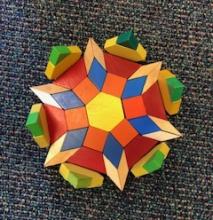My name is Alexandra (Alex) Fell and I am a staff research assistant on the Growing Words Project. This job might seem like a big left turn for me; I was a kindergarten teacher (with one year of first grade!) for ten years before this. In actuality this position makes perfect sense for a former educator. Nearly daily in my teaching work I would find myself wishing for more resources in identifying better ways to help my students. As a researcher, I’m able to bring that thinking into our work as we look at language processing and development.
In the classroom I was tasked with helping brand new students adjust to school, as well as teaching them to read by the end of their kindergarten year. For many children this wasn’t their first classroom experience and they often came in with some skills that prepared them for the classroom. But for every student that came in reading, there was also a student who came in having had no exposure to any kind of academics. This is a huge spread of skill level and it felt daunting at times. Using strategies I’d amassed from experiences and mentors, and with the help of other teachers and specialists, my students made lots of progress by the end of the school year.
However, nearly every year I encountered a student who didn’t respond to the instructional techniques that seemed to work for most children. Despite a structured phonics program, phonemic awareness exercises, and sight word instruction, these students made very little progress. Even after responses to intervention (RTI, in classroom parlance) that targeted these skills, some kids still did not grow. As a teacher it was clear other things were at play here. It wasn’t because this child did not want to learn, and it wasn’t because we weren’t giving that child many different access points to gain the knowledge needed. There was another barrier -- or perhaps many barriers.
These children would leave my kindergarten room after we’d talked about them all year and attempted many forms of intervention, and often move on to the same protocol in first and second grade before possibly later being identified with some sort of reading disability, if this ever happened. Colleagues and I would become frustrated because we knew there was something keeping this child from making the gains that were possible. These experiences are what drove me to involvement in research that might help educators (and parents) understand more about what specifically could be going on that keeps some kids from moving forward in reading.
Upon starting this job I’ve learned a great deal more about Developmental Language Disorder (DLD) which affects around 12% of the population – this is about 1 in 8 children. This is something that I wish I’d known in my years of teaching. With the Growing Words Project, we will attempt to tease apart the mechanisms for spoken and written language processing as it develops to understand what might be preventing some children from making the same progress as their peers. I won’t know for certain that the students I worked with had DLD (which also often overlaps with dyslexia), but I hope the work we are doing might be able to provide teachers new information that could help future students who present similar challenges.
Additionally, I hope to bring my classroom experience and understanding of school systems to this job as a step in bridging the gap between schools and research institutions. I feel strongly that teachers should be receiving the most up-to-date research about how kids learn, and in many cases teachers should also be driving research areas that heavily affect the classroom. When this work is completed, we hope to use our resources to share what we have learned with educators.
If you are a teacher and you are interested in hearing more or have questions about our work, please email us at growing-words@uiowa.edu!
-Alex Fell

